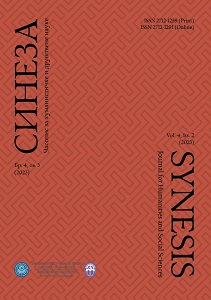Аустроугарска антиустаничка акција у Херцеговини лета 1875.
Austro–Hungarian counter–insurgency action in Herzegovina in the summer of 1875
Author(s): Bratislav TeinovićSubject(s): Civil Society, Political history, 19th Century, The Ottoman Empire
Published by: Filozofski fakultet, Univerzitet u Banjoj Luci
Keywords: Austria–Hungary; Herzegovina; Turkey; Bosnian Vilayet; uprising; Catholics; Serbs; Vienna cabinet;
Summary/Abstract: From the moment the uprising in Herzegovina took on the character of the Serbian political struggle for national liberation from Turkish rule and unification with Serbia, the government in Vienna became Porteʼs main ally in suppressing it. Independently of Austria–Hungary and its Catholic wards in Herzegovina, the Serbs in Nevesinje raised an uprising on July 1, 1875, with an aim of gaining autonomy and uniting with the Principality of Serbia and the Principality of Montenegro, completely contrary to the geopolitical interests and plans of the government in Vienna. With the arrival of Duke Mićo Ljubibratić in Herzegovina, Serbian political idea definitely prevailed in the uprising, which finally put an end to any interest in the success of anti–Turkish military action the government in Vienna might have had. Intimidating its believers daily with Serbs and Orthodoxy, the Croatian “Zagreb Catholic Newspaper“ wrote about the uprising in Herzegovina as a movement for the “restoration of old Serbia“. Already at the end of July and beginning of August 1875, Austria–Hungary openly began to help the Turks in suppressing the uprising. The Turkish fight against the Serbian insurgents in Herzegovina intensified in August 1875, in which Austria–Hungary played a significant role. Fresh Turkish troops arrived unhindered through Klek, and were then transferred to Herzegovina for the war against the Serbian insurgents. Another weak spot for the insurgents was the Cape Sutorina, where fresh Turkish military forces arrived in it by steamships, and were then transferred to the Herzegovinian battlefield. The route of the upcoming policy of the Viennese cabinet towards the Serbian uprising in Herzegovina became quite clear, especially when at the beginning of September 1875, in the influential German newspaper “Nazional Zeitung“, information appeared about how the Austro–Hungarian army was almost forced to militarily occupy the entire Bosnian Vilayet and thereby stop further Serbian expansion to its South Slavic provinces. Don Ivan Musić, the leader of the Catholic company in Popovo polje acted according to the instructions received from Vienna. After that, Musićʼs role in the uprising in Herzegovina became clear to everyone. In the following period, don Musić will represent the main exponent of the Austro–Hungarian conquest policy in Herzegovina.
Journal: Sineza
- Issue Year: 4/2023
- Issue No: 3
- Page Range: 67-79
- Page Count: 13
- Language: Serbian

